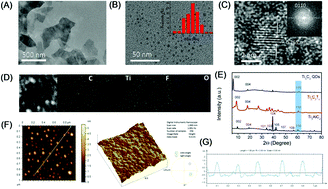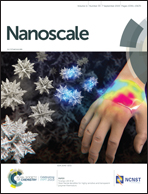Ti3C2 MXene quantum dot-encapsulated liposomes for photothermal immunoassays using a portable near-infrared imaging camera on a smartphone†
Abstract
Methods based on the photothermal effect (a common phenomenon in nature) have been widely applied in different fields; however, their application in bioanalysis has lagged behind. Herein, we designed a near-infrared (NIR) photothermal immunoassay for the qualitative or quantitative detection of prostate-specific antigen (PSA) using titanium carbide (Ti3C2) MXene quantum dot (QD)-encapsulated liposomes with high photothermal efficiency. This system involves a sandwich-type immunoreaction and photothermal measurements. Ti3C2 MXene QDs were utilized as innovative photothermal signal beacons and were encapsulated in liposomes for the labeling of the secondary antibody. The assay was carried out by coupling a low-cost microplate with a homemade 3D printed device. Under NIR-laser irradiation, the Ti3C2 MXene QDs converted the light energy into heat, and a shift in temperature corresponding with the analyte concentration was obtained on a handheld thermometer. Under optimal conditions, the Ti3C2 MXene QD-based photothermal immunoassay exhibited a dynamic linear range from 1.0 ng mL−1 to 50 ng mL−1 with a limit of detection of 0.4 ng mL−1 for PSA detection. Also, we constructed portable equipment using a portable near-infrared imaging camera to collect visual thermal data for the semi-quantitative analysis of the target PSA within 3 min. The specificity, reproducibility and accuracy of the photothermal immunoassay were acceptable. Importantly, our strategy opens new opportunities for protein point-of-care (POC) testing and biosecurity diagnostics.



 Please wait while we load your content...
Please wait while we load your content...